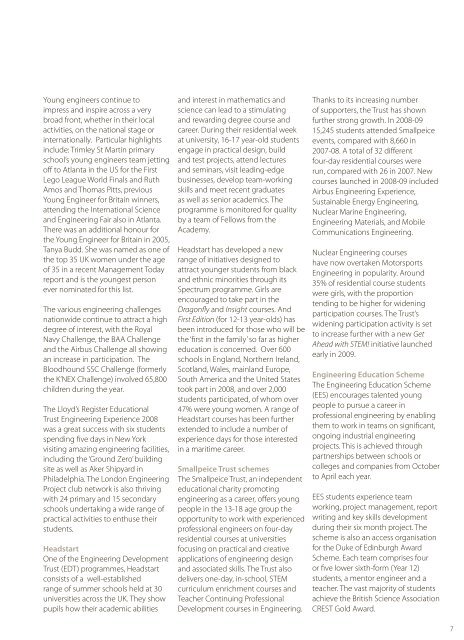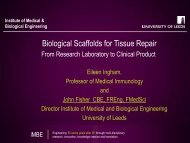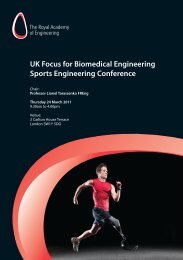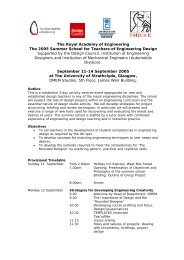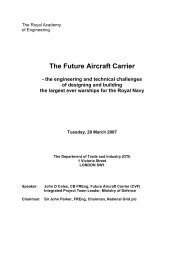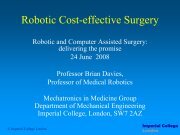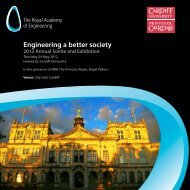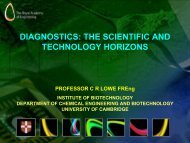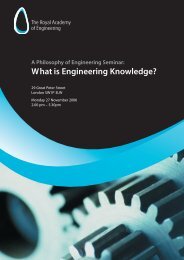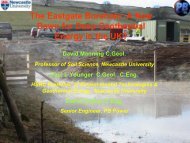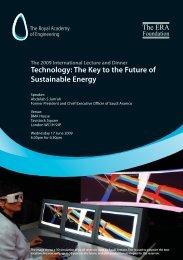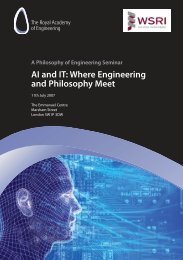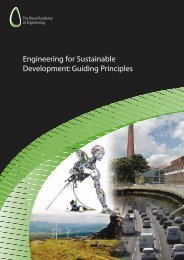Annual Report - Royal Academy of Engineering
Annual Report - Royal Academy of Engineering
Annual Report - Royal Academy of Engineering
You also want an ePaper? Increase the reach of your titles
YUMPU automatically turns print PDFs into web optimized ePapers that Google loves.
Young engineers continue to<br />
impress and inspire across a very<br />
broad front, whether in their local<br />
activities, on the national stage or<br />
internationally. Particular highlights<br />
include: Trimley St Martin primary<br />
school’s young engineers team jetting<br />
<strong>of</strong>f to Atlanta in the US for the First<br />
Lego League World Finals and Ruth<br />
Amos and Thomas Pitts, previous<br />
Young Engineer for Britain winners,<br />
attending the International Science<br />
and <strong>Engineering</strong> Fair also in Atlanta.<br />
There was an additional honour for<br />
the Young Engineer for Britain in 2005,<br />
Tanya Budd. She was named as one <strong>of</strong><br />
the top 35 UK women under the age<br />
<strong>of</strong> 35 in a recent Management Today<br />
report and is the youngest person<br />
ever nominated for this list.<br />
The various engineering challenges<br />
nationwide continue to attract a high<br />
degree <strong>of</strong> interest, with the <strong>Royal</strong><br />
Navy Challenge, the BAA Challenge<br />
and the Airbus Challenge all showing<br />
an increase in participation. The<br />
Bloodhound SSC Challenge (formerly<br />
the K’NEX Challenge) involved 65,800<br />
children during the year.<br />
The Lloyd’s Register Educational<br />
Trust <strong>Engineering</strong> Experience 2008<br />
was a great success with six students<br />
spending five days in New York<br />
visiting amazing engineering facilities,<br />
including the ‘Ground Zero’ building<br />
site as well as Aker Shipyard in<br />
Philadelphia. The London <strong>Engineering</strong><br />
Project club network is also thriving<br />
with 24 primary and 15 secondary<br />
schools undertaking a wide range <strong>of</strong><br />
practical activities to enthuse their<br />
students.<br />
Headstart<br />
One <strong>of</strong> the <strong>Engineering</strong> Development<br />
Trust (EDT) programmes, Headstart<br />
consists <strong>of</strong> a well-established<br />
range <strong>of</strong> summer schools held at 30<br />
universities across the UK. They show<br />
pupils how their academic abilities<br />
and interest in mathematics and<br />
science can lead to a stimulating<br />
and rewarding degree course and<br />
career. During their residential week<br />
at university, 16-17 year-old students<br />
engage in practical design, build<br />
and test projects, attend lectures<br />
and seminars, visit leading-edge<br />
businesses, develop team-working<br />
skills and meet recent graduates<br />
as well as senior academics. The<br />
programme is monitored for quality<br />
by a team <strong>of</strong> Fellows from the<br />
<strong>Academy</strong>.<br />
Headstart has developed a new<br />
range <strong>of</strong> initiatives designed to<br />
attract younger students from black<br />
and ethnic minorities through its<br />
Spectrum programme. Girls are<br />
encouraged to take part in the<br />
Dragonfly and Insight courses. And<br />
First Edition (for 12-13 year-olds) has<br />
been introduced for those who will be<br />
the ‘first in the family’ so far as higher<br />
education is concerned. Over 600<br />
schools in England, Northern Ireland,<br />
Scotland, Wales, mainland Europe,<br />
South America and the United States<br />
took part in 2008, and over 2,000<br />
students participated, <strong>of</strong> whom over<br />
47% were young women. A range <strong>of</strong><br />
Headstart courses has been further<br />
extended to include a number <strong>of</strong><br />
experience days for those interested<br />
in a maritime career.<br />
Smallpeice Trust schemes<br />
The Smallpeice Trust, an independent<br />
educational charity promoting<br />
engineering as a career, <strong>of</strong>fers young<br />
people in the 13-18 age group the<br />
opportunity to work with experienced<br />
pr<strong>of</strong>essional engineers on four-day<br />
residential courses at universities<br />
focusing on practical and creative<br />
applications <strong>of</strong> engineering design<br />
and associated skills. The Trust also<br />
delivers one-day, in-school, STEM<br />
curriculum enrichment courses and<br />
Teacher Continuing Pr<strong>of</strong>essional<br />
Development courses in <strong>Engineering</strong>.<br />
Thanks to its increasing number<br />
<strong>of</strong> supporters, the Trust has shown<br />
further strong growth. In 2008-09<br />
15,245 students attended Smallpeice<br />
events, compared with 8,660 in<br />
2007-08. A total <strong>of</strong> 32 different<br />
four-day residential courses were<br />
run, compared with 26 in 2007. New<br />
courses launched in 2008-09 included<br />
Airbus <strong>Engineering</strong> Experience,<br />
Sustainable Energy <strong>Engineering</strong>,<br />
Nuclear Marine <strong>Engineering</strong>,<br />
<strong>Engineering</strong> Materials, and Mobile<br />
Communications <strong>Engineering</strong>.<br />
Nuclear <strong>Engineering</strong> courses<br />
have now overtaken Motorsports<br />
<strong>Engineering</strong> in popularity. Around<br />
35% <strong>of</strong> residential course students<br />
were girls, with the proportion<br />
tending to be higher for widening<br />
participation courses. The Trust’s<br />
widening participation activity is set<br />
to increase further with a new Get<br />
Ahead with STEM! initiative launched<br />
early in 2009.<br />
<strong>Engineering</strong> Education Scheme<br />
The <strong>Engineering</strong> Education Scheme<br />
(EES) encourages talented young<br />
people to pursue a career in<br />
pr<strong>of</strong>essional engineering by enabling<br />
them to work in teams on significant,<br />
ongoing industrial engineering<br />
projects. This is achieved through<br />
partnerships between schools or<br />
colleges and companies from October<br />
to April each year.<br />
EES students experience team<br />
working, project management, report<br />
writing and key skills development<br />
during their six month project. The<br />
scheme is also an access organisation<br />
for the Duke <strong>of</strong> Edinburgh Award<br />
Scheme. Each team comprises four<br />
or five lower sixth-form (Year 12)<br />
students, a mentor engineer and a<br />
teacher. The vast majority <strong>of</strong> students<br />
achieve the British Science Association<br />
CREST Gold Award.<br />
7


